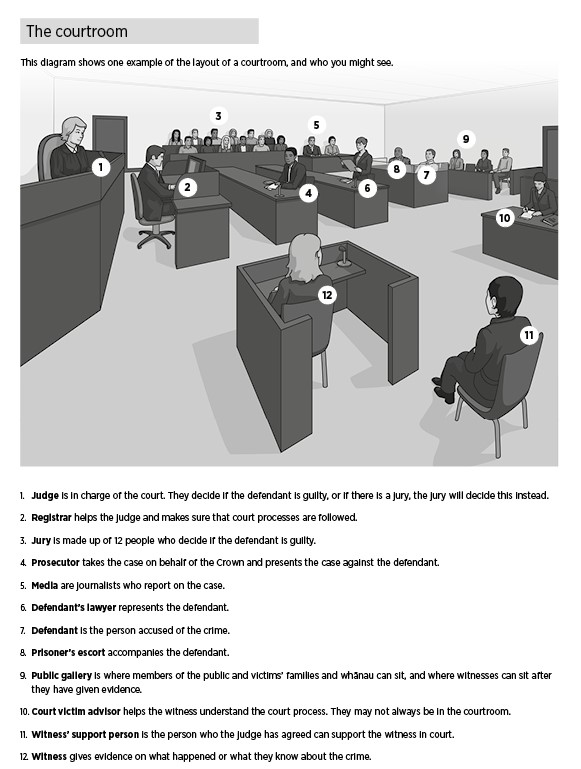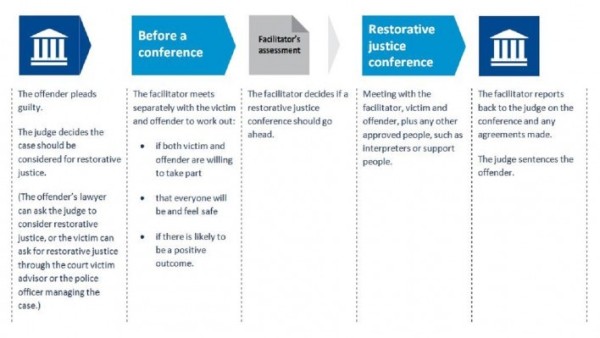Information for Victims
Information for Victims
This section outlines the Justice process, describes what a victim can expect, and where to go for more support.
Report a Crime
In this section you can find information on how to report a crime, the police investigation process and how you can get protection.
Victims and people who have witnessed or know about a crime can make a report to the police. Reporting a crime can increase safety, prevent the offender from committing the crime again and help a victim receive financial grants or make an insurance claim. Remember, you can discuss your options with police before deciding if you'll formally report the crime.
How to Report a Crime
Reporting a crime as soon as possible can help keep you and other people safe. You can still report a crime to the police no matter how long ago the crime happened.
Making a Statement to the Police
If you're the victim of a crime or a witness A person who tells the court about what they have seen, heard or experienced. View the full glossary and it has been reported to the police, the police officer who has been assigned to the case will ask you to make a detailed statement about what happened.
This can happen at a different time to when you first report the crime, and it might be a different police officer.
Starting the Investigation
The Police investigate the crime. A police officer in charge Your main contact person with the police for your case. View the full glossary is responsible for the investigation and getting the case ready.
Laying Charges
After the crime has been reported to the police and they have investigated the case, they'll decide whether they can lay charges. Police will tell you what the person has been charged with. Not all police investigations lead to a person being charged but no matter what happens, you're believed.
Getting Protection
There are many ways for you, your whānau and friends to apply for protection and be safe. Below is a list of some ways you can apply for protection through the police and the courts.
Staying informed
Sometimes it can feel like you don't know what is happening with the investigation. You have a right to information about the progress and can contact the police, your court victim advisor A Ministry of Justice staff member who can explain the court process and keep victims informed on the progress of their case. View the full glossary or support service for an update.
Types of Crime
There are many different types of crime, and the court and police will use specific names for them. This may include homicide When a person is killed by another person. View the full glossary , family violence, sexual violence and crimes committed by children or young people A person between the ages 14 - 17 View the full glossary .
Your Support Person
You have a right to a support person and you don't have to go through the process alone. There are free support and counselling services available to you.
A list of support services, their phone numbers and websites are available here: Ways to Get Support
Going to Court
In this section you can find information on what happens once a case has entered the court system, how to prepare for court, and the role of the court victim advisor.
Court cases can take a long time, involve a lot of people, and include unfamiliar language. You have a right to understand what’s happening in your case and can ask your court victim advisor or the police officer in charge of your case about anything you’re unsure of.
The Plea
When the defendant first appears in court, they'll be asked to plead guilty or not guilty.
If the defendant is not ready to plead, the court will decide if the defendant stays in custody or is released back into the community on bail When police release someone who's charged with a crime on the condition that they attend future court hearings. View the full glossary between court appearances. This means that the defendant’s case will be put off to a later date, so they can get legal advice.
Court Victim Advisors
Court victim advisors provide information to victims from the defendant’s first day in court, until sentencing This is when the Judge decides what happens to the offender Person convicted of a crime (before being found guilty, the person charged with the offence is called 'defendant'). View the full glossary if they've pleaded or been found guilty. View the full glossary and through any appeals. This is a free service.
Victim Impact Statement
As a victim you have the right to make a victim impact statement A record of how the crime has affected the victim. This is usually done in writing, but can include photographs, drawings or poems. A judge must consider it when sentencing This is when the Judge decides what happens to the offender Person convicted of a crime (before being found guilty, the person charged with the offence is called 'defendant'). View the full glossary if they've pleaded or been found guilty. View the full glossary an offender. The victim can read the statement to the court just before sentencing View the full glossary . This gives you a chance to talk about how you feel, and what has happened to you because of the crime.
Types of Hearings
In Aotearoa, New Zealand, criminal cases are either heard by just a judge (judge-alone trial) or by a group of 12 people which make up a jury Twelve people from the community who decide if the person is guilty or not guilty. View the full glossary (jury trial). A jury trial is only possible when the crime the defendant was charged with results in a two-or-more year prison sentence The consequences of the crime for the offender Person convicted of a crime (before being found guilty, the person charged with the offence is called 'defendant'). View the full glossary if they've pleaded or been found guilty. View the full glossary .
Preparing for Court
Court can be intimidating and the thought of going to court can make some people feel nervous or anxious, especially if they also must
Getting ready for Court
Interpreters
How the Court works
Courts can be unfamiliar and frightening environments. The police,
Arriving at the Court
Your privacy
Your right to be informed
Expenses
The people in Court
There are lots of different people involved in a court case. It's important for you to feel as comfortable and familiar as possible with who you will be speaking to in a court. Most of these people will be present in the court room when you give your
Court Room Set Up
The Judge
The Court Registrar and Court Attendant
Police Officer in Charge
The Jury
The Prosecuting Lawyers
The Defence Lawyers
The Defendant
Your Court Support Person
Giving Evidence
Giving
You'll be asked questions by the defendant’s lawyer and the police prosecuting lawyer about what happened, or what you know about the crime. You may also be asked some questions directly from the Judge.
Ways you can give evidence
Child Witnesses
The Verdict and Sentencing
Once all the
The Verdict
Sentencing
Types of Courts
There are lots of different courts in New Zealand. This page talks about courts that deal with criminal matters. Information on types of courts and tribunals can be found at: The Courts of New Zealand website(external link)
District Courts
High Courts
Court of Appeal
Supreme Court
Family Court
Youth Court
After Sentencing
In this section you can find information on the different things that can happen after sentencing, how to stay informed and ways to help you in your recovery.
Sentencing comes at the end of what is usually a long court process. You may have focused all your energy and attention on the court process and it's a normal reaction to feel lost, disappointed or let down after it's over.
Appealing the Court Outcome
Both the Police
Your
Who can appeal?
What happens if the court allows the appeal?
Reparation Payments
The judge can order the
More Information
How Parole Works
This may be earlier than you expect. Time they spent in custody before they were convicted and sentenced can be counted as part of the time they have spent in prison.
Parole Hearings
Making a Submission to the Parole Board
When the Offender can be released on Parole
Conditions of Parole
Restorative Justice
A
The Restorative Justice Conference
Staying Informed
If you've been the victim of a
Victim Notification Register
Applying to go on the Victim Notification Register
Nominate someone else to the receive the information
Your Recovery
The end of the court process doesn’t mean that the impact of the crime has gone away. Everybody experiences crime differently and it's normal for the impact of the crime to have a lasting effect on you.
You can still get support and assistance after the court process has finished.
Professional support agencies can:
- offer counselling and talk through your experience and expectations of the court process, or
- provide practical assistance if you feel like you need help to get your life back on track.
Contact the Victims Information Line on 0800 650 654, your
Ways to Get Support
In this section you can find out about victims’ rights, support services and financial assistance that's available to victims of crime.
Victims Rights
Victims of crime in New Zealand have rights. These rights are set out in the
If you believe you haven't been treated fairly then you have the right to make a complaint.
Victims Code Principles
Make a Complaint
You can get support
The end of the court process doesn’t mean that the impact of the crime has gone away. Everybody experiences crime differently and the effects can last for a long time. There are options available for you to find the support you need.
In this section you can find the contact details for organisations that can provide you, your whānau or friends with support and information across Aotearoa, New Zealand.
Contact Details
Protection
If you feel unsafe, there are options available for you through the Court to help protect you from harm and remain safe.
Protection Orders
Restraining Orders
Non-contact Orders
Strengthening Safety Services
Staying Safe Online
Financial Support
The physical and mental impact of a crime can be long lasting and getting support can be expensive. There are options available to victims to help cover some of these costs.
Victim Support
Accident Compensation Corperation (ACC)
Witness Expenses
Insurance
Victims' claims compensation
Elderly Victims of Crime
Dealing with the Media
Some crimes (especially
If you do decide to speak to the media the following tips can help
Can the media report my evidence or other things about the case?
Complaints or concerns about the media
Legal Assistance
If you're a victim of a crime you don't need to have a lawyer. But if you're unsure of your legal rights or need help with other things – like family law matters – because of the crime, you may want to talk to a lawyer.
Below is a list of where you can get legal assistance.
Contact Details
Christchurch Mosque Attack
This section contains information for the victims, families and those affected by the attacks on the two Christchurch Mosques on 15 March 2019.
Wellbeing Information and Support
FAQs and Factsheets for victims of the Mosque attacks
Resources
- More information on offence categories and types of trials - types of offences. (PDF, 323 KB)
- Victims of crime in New Zealand have rights. These rights are set out in the Victims Code (PDF, 577 KB)(external link).
- Information on Court Services for Victims (PDF, 166 KB).
- Moving through the criminal justice system – what happens and where to get help (PDF, 815 KB).





